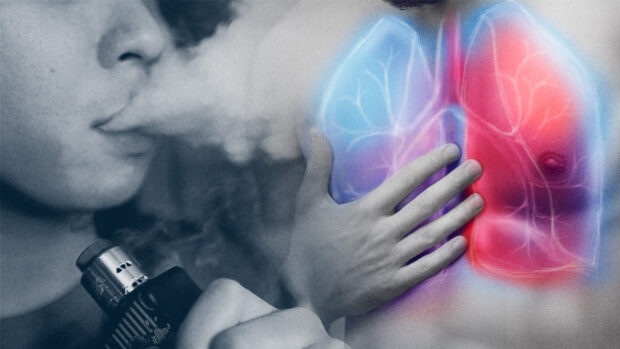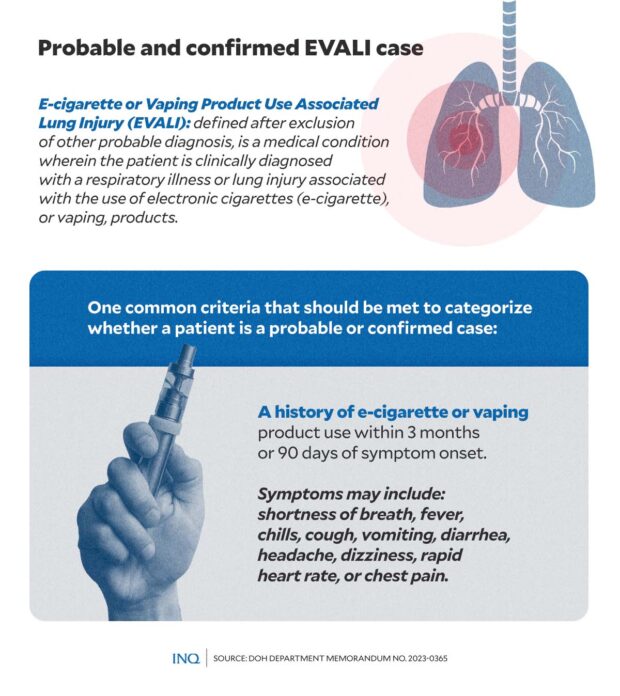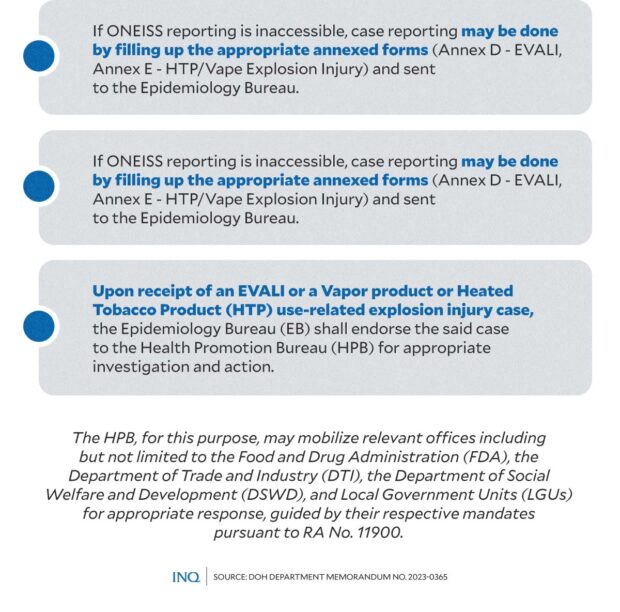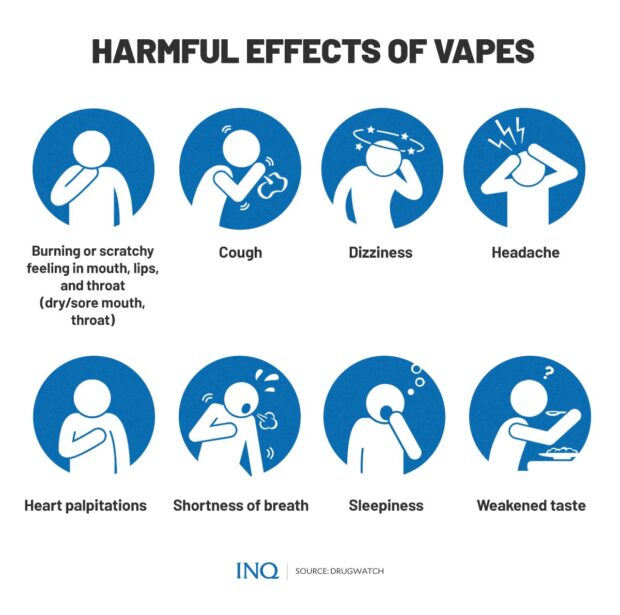DOH issues guidelines on reporting, managing vape-related injury, death in PH

E-CIGARETTE OR VAPING PRODUCT USE ASSOCIATED LUNG INJURY —COMPOSITE IMAGE FROM INQUIRER STOCK AND FILE PHOTOS
MANILA, Philippines—Over a year after the Vape Bill lapsed into law, the Department of Health (DOH) has prepared public health care guidelines that could help manage and report E-cigarette- or Vaping product-use Associated Lung Injury (EVALI) and related injuries.
In June last year, the measure seeking the regulation of vaporized nicotine (vape) and non-nicotine products, as well as novel tobacco products — also known as the “Vape Bill” — lapsed into law.
The measure regulates the importation, manufacture, sale, packaging, distribution, use, and communication related to vaporized nicotine or vape and non-nicotine products, including novel tobacco products.
Legislators and proponents of tobacco harm reduction believe that the comprehensive yet controversial law can help save the lives of millions of smokers and protect minors from the harm of vape and non-nicotine products.
READ: Vape law to regulate new products, save adult smokers and protect minors – advocates
However, with the harmful effects of vape and heated tobacco products (HTPs) — which studies showed are more damaging than smoking cigarettes — experts believe more efforts should be made to effectively monitor EVALI cases in the country.
Article continues after this advertisementREAD: National No Smoking month: Cigarette alternatives just as harmful
Surveillance system
In a memorandum dated September 11, 2023, the DOH laid out the interim guidelines on the diagnosis, treatment, management, and reporting of EVALI cases and related injuries and deaths.
Article continues after this advertisementIn the memorandum, the health department has received reports of EVALI and related injury cases.
“With the increasing incidence of suspected EVALIreports, it is paramount to put in place a strong surveillance system for injury cases resulting from the use of and exposure to covered products, to guide planning and implementation of appropriate prevention and control measures,” the DOH stated.

GRAPHIC Ed Lustan
Prior to the memorandum, experts said EVALI cases were not included in the regular disease surveillance report of the DOH.
“DOH does not have an official mechanism yet, unlike with the infectious diseases, there is a protocol on that. The World Health Organization (WHO) actually requires reporting cases of diseases such as tuberculosis, malaria, among others,” said Southeast Asia Tobacco Control Alliance (SEATCA) executive director Dr. Ulysses Dorotheo last May.
Reporting EVALI
The health department stressed in the guidelines that all EVALI and related explosion injury cases and deaths shall be reported by the attending health care provider through the Online National Electronic Injury Surveillance System (ONEISS) of the DOH.
“In reporting EVALI and related explosion injury cases and deaths, the reporting health care provider must provide the necessary information in the ONEISS,” said DOH.
“If ONEISS reporting is inaccessible, case reporting may be done by filling up the appropriate annexed forms (Annex D – EVALI, Annex E – HTP/Vape Explosion Injury) and sent to the Epidemiology Bureau,” DOH added.
Reported EVALI and related explosion injury cases and deaths should be then endorsed to the Health Promotion Bureau (HPB) for appropriate investigation and action.
“The HPB, for this purpose, may mobilize relevant offices including but not limited to the Food and Drug Administration (FDA), the Department of Trade and Industry (DTI), the Department of Social Welfare and Development (DSWD), and Local Government Units (LGUs) for appropriate response, guided by their respective mandates pursuant to RA No. 11900,” DOH explained.

GRAPHIC Ed Lustan
While there is no detailed record yet of the number of cases of EVALI and related injuries and deaths in the country, the DOH reported the first EVALI case in the Philippines in November 2018.
In a statement, a private pulmonologist confirmed to the health department that the 16-year-old patient from Visayas, who was admitted to the hospital on Oct. 21, initially was seen with “sudden-onset severe shortness of breath, required oxygen supplementation and Intensive Care Unit admission.”
After further investigation, the physician said the girl was diagnosed with EVALI as per the guidelines of US Centers for Disease Control.
READ: DOH cites 1st PH case of vape-related injury
Probable and confirmed cases
According to the interim guidelines by DOH, EVALI is a “medical condition wherein the patient is clinically diagnosed with a respiratory illness or lung injury associated with the use of electronic cigarettes (e-cigarette), or vaping,’ products.”
It is defined after careful exclusion of other probable diagnoses.
The diagnosis of EVALI cases can be categorized by health care experts or attending physicians as probable or confirmed based on a series of criteria.

GRAPHIC Ed Lustan
One common criterion that should be met to categorize whether a patient is a probable or confirmed case is if a patient has a history of e-cigarette or vaping product use within three months or 90 days of symptom onset.
DOH noted that symptoms may include shortness of breath, fever, chills, cough, vomiting, diarrhea, headache, dizziness, rapid heart rate, or chest pain.
RELATED STORIES:
As vaping ‘epidemic’ grips PH youth, tobacco sellers flout law vs targeting kids
